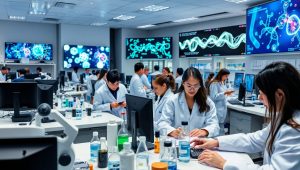Pharmaceutical research labs are at the forefront of medical innovation, driving the discovery of new drugs, therapies, and treatments that have the potential to save lives and improve health worldwide. These research facilities are essential for advancing our understanding of diseases, developing effective medications, and ensuring the safety and efficacy of treatments. With their combination of cutting-edge technology and highly skilled scientists, pharma research labs play a critical role in shaping the future of healthcare.
The Role of Pharma Research Labs
Pharmaceutical research labs are dedicated spaces where scientists and researchers study the mechanisms of diseases, explore potential drug candidates, and test new treatment methods. Their work is the foundation upon which the pharmaceutical industry builds, leading to the development of innovative medications that address unmet medical needs.
One of the primary functions of these labs is to conduct preclinical and clinical research. Preclinical research involves laboratory experiments and animal studies to evaluate the safety and effectiveness of a drug before it is tested in humans. Clinical research, on the other hand, involves trials with human participants to assess the drug’s safety, dosage, side effects, and overall efficacy. Both phases are critical to ensuring that new drugs are both safe and effective for public use.
Drug Discovery and Development
Drug discovery is one of the most exciting aspects of pharmaceutical research. Researchers in pharma labs utilize a wide range of techniques to identify potential drug candidates. This process often starts with basic scientific research into the molecular causes of diseases, which leads to the identification of specific targets—such as proteins or enzymes—that could be influenced by a drug.
High-throughput screening is a technique commonly used in drug discovery. This method involves testing thousands of compounds in a short period to find those that interact with the target of interest. Once promising compounds are identified, researchers refine and optimize them to improve their effectiveness and reduce any potential side effects.
Once a potential drug candidate is identified, it moves into the development phase, where its formulation, dosage, and administration routes are optimized. Pharmaceutical research labs play a crucial role in this process, working to ensure that the drug is safe, effective, and suitable for mass production and distribution.
The Importance of Collaboration
Pharmaceutical research labs do not work in isolation. Collaboration between researchers, academic institutions, and pharmaceutical companies is essential for successful drug development. Many pharmaceutical companies partner with universities and other research organizations to leverage external expertise and resources. This collaborative approach accelerates the research process and increases the likelihood of discovering breakthrough treatments.
In addition, pharma research labs often collaborate with regulatory agencies such as the U.S. Food and Drug Administration (FDA) and the European Medicines Agency (EMA) to ensure that the drugs they develop meet stringent safety and quality standards. These collaborations ensure that once a drug is ready, it can be approved and brought to market efficiently.
Technological Advancements in Pharma Research
Advancements in technology have revolutionized pharmaceutical research, enabling scientists to work more efficiently and effectively. Techniques such as gene editing, artificial intelligence (AI), and machine learning are now integral to drug discovery. AI, for example, is used to predict how different drug molecules will behave in the body, speeding up the discovery process and minimizing the need for extensive trial and error.
Another important technological innovation is the use of lab automation. Automated systems allow researchers to conduct repetitive tasks—such as mixing chemicals or analyzing samples—more quickly and accurately. This increases the throughput of research labs and ensures that researchers can focus their time on more complex tasks.
Challenges and the Future of Pharma Research
While pharmaceutical research labs are a vital part of healthcare innovation, they face numerous challenges. The drug development process is time-consuming and costly, with many drug candidates failing during clinical trials. Additionally, the regulatory landscape is complex, and labs must ensure compliance with ever-evolving standards.

Hi, this is a comment.
To get started with moderating, editing, and deleting comments, please visit the Comments screen in the dashboard.
Commenter avatars come from Gravatar.